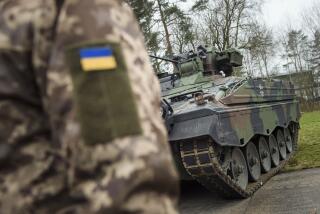Germany Steps Up Its Role : Lopsided Parliament vote approves sending small force to Bosnia theater
- Share via
The German Parliament’s vote for sending selected armed forces to support the new U.N. rapid reaction force in Bosnia marks a historic change for a nation long economically and politically prominent in regional affairs. By at last deciding to take on a heavier international security burden--a course strongly urged by its closest allies--Germany is decisively and necessarily turning a page on its past.
Though fully integrated with Europe through its prominent roles in NATO and the European Union, Germany had felt both politically and legally constrained from participating in any military operation outside the immediate NATO area. Then, a year ago, the country’s highest court ruled that German troops could take part in international military operations if prior parliamentary approval was given. The obvious place to make a commitment was in support of NATO operations affecting Bosnia.
Chancellor Helmut Kohl’s Cabinet decided to send about 1,500 soldiers to support the U.N. mission. No ground combat forces will be involved, for obvious reasons--Nazi Germany brutally occupied Yugoslavia from 1941 to 1945. Germany’s contribution will involve medical and other support personnel, transport planes and, most significantly, eight Tornado jet fighters, which can be armed with missiles to neutralize Bosnian Serb antiaircraft missiles. Germany doesn’t intend its forces to have a combat role in or over Bosnia, but the area is a war zone and the potential for conflict will exist.
The big parliamentary majority for the government’s initiative--386 in favor, 258 opposed--demonstrates a consensus on this issue that cuts across party lines. Defense Minister Volke Ruhe describes the German decision as prompted by a sense of solidarity with Britain and France, its closest European partners, as well as by humanitarian need. It is also a precedent. After 50 years of restraint in its foreign policy, Germany has now opted for a greater and, we think, more positive security role, and that should be welcomed.
More to Read
Sign up for Essential California
The most important California stories and recommendations in your inbox every morning.
You may occasionally receive promotional content from the Los Angeles Times.













